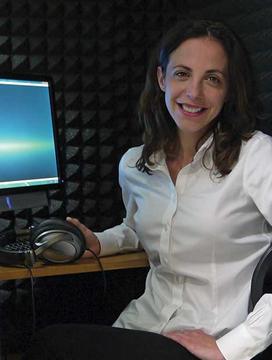Professor Elizabeth Margulis Investigates Why Music Affects Us
‘What is a mind? What is music?’ Margulis asks in her research
Now, as a Princeton professor, Margulis is investigating why music affects us, with research that bridges art and science. While her Music Cognition Lab is housed in the Woolworth Music Building, its researchers work with neuroimaging and behavioral experimentation as well as music theory and musicology.
Music could also tell us something about humanity. It exists in every culture and is deeply entwined with aspects of thinking that include language, social relations, and movement. Imaging shows that we use many parts of the brain together when we make or listen to music.
Yet centuries of scholarship have not definitively answered the most basic question: What is music? Why do we call a sound we make music rather than speech or poetry? Speak a single word over and over, and its meaning falls away and musicality emerges. Likewise, rapidly replay a short snippet of recorded poetry, and it seems to transform into singing.
Margulis believes phenomena such as these hold clues to how our brains produce and decode communication and what it means to understand another person.
“What are we doing when we do music, and why are we doing that? What are we getting out of it?” she asks.
In her best-known research, Margulis showed that repetition is central to how we understand music. In one experiment, she used a modern instrumental composition that in its original form was relatively free of repetition. She created an alternate version by having a computer loop random sections of the piece. Listeners hearing both versions believed the machine-generated, repetitive recording was the human composition.
Such research has sometimes sought to reverse-engineer musical artistry, but that is not Margulis’ goal. Instead, she studies the power that great performances have to transport us, searching for the source of those emotions as a scientist and artist.
When she began her career, with a Ph.D. from Columbia, Margulis felt as if she were “shouting from the sidelines.” But since then, the interdisciplinary approach to the psychology of music has grown.

“It finally feels like there’s that web of resources and brainpower to actually make some headway,” says Margulis, who came to Princeton in 2019 after 16 years as a professor at the University of Arkansas. “It’s a really exciting time.”
Margulis’ research has found that even nonmusicians have sophisticated listening skills that require complex cognition. Tapping your foot to a catchy song is easy, but replicating that ability to recognize a beat proved difficult in a computer. We can hear a complex rhythm effortlessly even if we don’t know how to write a set of rules to identify it in a waveform.
Our minds transform what we hear in unconscious ways. Margulis played a musical recording for subjects in a brain-imaging machine, telling some the performer was a world-famous pianist and others that they were hearing a conservatory student. The reward circuitry in listeners’ brains — the indicator of pleasure — lit brighter if they believed the player was a professional.
She has also uncovered a related finding about how expectations change what we hear: Concert-goers enjoyed classical music more if they had not read the program notes first.
Margulis still isn’t sure why that happens, but she has some ideas. It’s part of the mystery that first pulled her into psychology, of why music works in our brains — the mystery that inspired her to translate ideas between two seemingly distant disciplines.
She attributes much of her success to working with colleagues on either side of that divide.
“What is a mind? What is music? How might we study any of those things?” she says. “It makes for a really interesting field to be in right now because there are so many big questions.”












No responses yet